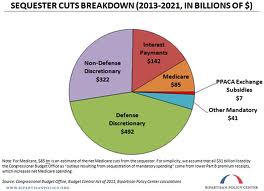Summary: The Patient Protection Affordable Care Act (PPACA) seeks to provide accessible affordable care to more 
Let’s start with the basics and talk about what sequestration means.
Summary: The Patient Protection Affordable Care Act (PPACA) seeks to provide accessible affordable care to more 
Let’s start with the basics and talk about what sequestration means.
Sequestration is across the board spending cuts issued by the federal government to assist in reducing the national deficit which is currently in the trillions. The sequestration was enacted in the first part of 2013. Some of the major areas which were cut were:
- Medicare
- The Food and Drug Administration (FDA)
- Medical funding grants
- Funding for medical schools and teaching hospitals
- Funding for medical research
- Centers for Disease Control (CDC)
- The Department of Health and Human Resources (HHS) and the Internal Revenue Service (IRS) specifically pertaining to implementing the PPACA
- Military
- Federal employee paychecks in the form of furloughs
- World Trade Center Fund
- Health insurance exchange grants
- Prevention and public health fund
We are starting to see the impact of these spending cuts in a ripple effect. One of the areas of concern is the treatment of cancer patients who are
At this point, clinics are faced with the following choices:
- No longer accept Medicare patients – currently approximately 60% of Medicare cancer patients are seen in a clinic setting. With this potential loss of patients, will the clinics be able to survive?
- No longer administer treatments which aren’t profitable
- Wait and see if the government will exempt cancer treatments from the sequestration
What does this mean to the patient?
- Patients will have less accessibility to treatment
- The treatments will be more costly
- Some of the costs will be passed along to the patient to the tune of about an additional $650 annually
- May have to wait for treatments based upon the availability of the hospital
What does this mean for hospitals?
- Hospitals will see a rise in Medicare cancer patients
- Healthcare costs will rise as hospitals charge approximately $6000 more for treatments than clinics do
- Additional staff may be required to treat these patients
- Will hospitals be able to absorb the influx of patients? Currently about 60% of Medicare cancer patients are currently being seen in a clinic setting.
Does the sequestration make sense as it specifically relates to Medicare cuts? The PPACA was designed to provide more affordable and accessible care to more Americans. If cancer patients are being turned away from clinics, isn’t this in direct contrast to what the PPACA is trying to accomplish? Is it worth jeopardizing the care of Medicare cancer patients? Shouldn’t patient care be first and foremost? Will we see a rise in cancer patients and deaths attributed to cancer? We would love to hear your comments.